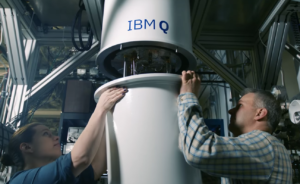 Motivated by recent IBM announcements about quantum computing (QC), I wrote an article “What IT Managers Should Know About Quantum Computing” published in Hacker Noon on Medium. The goal was to explain clearly the unusual aspects of QC and to suggest practical steps for thinking and planning for QC. The context is next-gen business analytics as embedded in operational business processes, such as marketing, manufacturing, and distribution systems.
Motivated by recent IBM announcements about quantum computing (QC), I wrote an article “What IT Managers Should Know About Quantum Computing” published in Hacker Noon on Medium. The goal was to explain clearly the unusual aspects of QC and to suggest practical steps for thinking and planning for QC. The context is next-gen business analytics as embedded in operational business processes, such as marketing, manufacturing, and distribution systems.
Ultra-Smart Data Concierge
Afterwards, I started to think about its relevance to IA. Yes, QC might make it possible to crunch hard algorithms quickly. But so what?
 What if… We created a virtual data world that had an ultra-smart data concierge, like that of an immersive Amazon Echo (although Dr. Data from StarTrek is a better analogy). By “ultra-smart” I am implying smarts at the level of human experts (or beyond!).
What if… We created a virtual data world that had an ultra-smart data concierge, like that of an immersive Amazon Echo (although Dr. Data from StarTrek is a better analogy). By “ultra-smart” I am implying smarts at the level of human experts (or beyond!).
It is like a knowledgeable doctor explaining your latest CT scan to you on the 3D screen, along with suggesting the diagnosis and treatment. His/her role is to guide you through this data world, interpreting its relevance to you. More importantly, the data concierge would extend your data world as your needs evolve and as new data emerges.
From Describing to Generalizing
As we have learned from current advances in data analytics, the true value of data lies not in just describing known data, but rather in generalizing beyond known data. This transition from describing to generalizing implies that ability to generate and test hypotheses about the data, directed by changing goals. Now, that’s an ultra-smart data concierge!
Research in deep learning suggests several examples. The IBM Jeopardy Challenge in 2011 illustrated the ultra-smart ability at a complex word game. However, the jeopardy game is bounded by the initial statement with a fixed problem space. In contrast, autonomous vehicles capabilities emerging from several vendors might be more appropriate. Although the goal maybe set as Location A to Location B, the problem space is changing, requiring constant sensing of the current environment and recalculation of the optimal solution.
Relevance to Immersive Analytics
Therefore, is QC relevant to IA? It is not obvious whether QC’s unique ability to crunch hard algorithms will be a requirement for the immersive data world of the future. However, if QC provides 100x or more improvement in response latency, the user experience of this data world would felt much more ‘natural’ and, therefore, more immersive.
Over the coming months, we should pay attention to discussions about computational complexity that contrasts algorithmic performance of QC with conventional computing. QC is expected to show reductions in compute time (for certain algorithms) from 10 centuries to 10 hours. However, will QC show reductions from 10 hours to 10 milliseconds? If so, then QC might be relevant to IA as a component of its compute engine. For clues, watch what happens with the use of QC with autonomous vehicles as those vehicles evolve.
